Choosing the right tools for your business will highly impact your ROI and can either increase your revenue or slow down your efforts.
If you’re doing your research before committing to a sales enablement platform you may have come across Instantly.ai and Apollo.io.
So it all boils down to this: Instantly vs Apollo: Who wins?
Instantly overview
Instantly.ai is a sales engagement and automation platform. Essentially it’s an all-in-one platform where you can carry out all of your outreach efforts to gain more clients.
Instantly offers many features that will help you grow your business.
- In automated outreach, you can send multi-step email campaigns with automated follow-ups, set to be sent with predetermined triggers. You’ll receive task reminders and handle responses automatically with Instantly.
- Your emails can be personalized and tailored to your recipients to improve your reply rates. You can either start your messages from scratch or use the predetermined templates, personalizing them as much as you want to fit your brand.
- Regarding lead generation, Instantly offers a lead database with 160M contacts at your disposal. Aside from the lead database, you can also import lead lists from LinkedIn and other platforms and segment them.
- Instantly integrates with email services and popular CRMs, such as Salesforce or HubSpot.
- Thanks to Instantly’s analytics and reporting you will be able to track your KPIs and analyze how your campaigns are doing in terms of CTRs, open rates, reply rates, and overall effectiveness. You will also be able to assess where to adjust to make sure you’re reaching your full outreach potential, including A/B testing.
Apollo overview
Apollo.io is a go-to-market sales engagement platform, that focuses on lead generation, sales engagement, and CRM. Compared to Instantly, Apollo has a larger suite of features to streamline your sales process, some of them including:
- An extensive lead database with +275M contacts and a wide variety of search filters to track down your ideal buyers. Aside from the lead database, you can import and enrich additional contact data, such as email addresses, phone numbers, social profiles, and company data.
- Apollo allows you to automate your outreach with personalized messages, scheduled email sequences, and pre-built templates.
- With Apollo, you can automate your tasks such as lead nurturing, follow-up reminders, and data entries, or create custom workflows. Aside from task automation, you can facilitate team management by supporting lead sharing, insights, campaign results, and team task management.
- Apollo offers solid integrations with popular CRMs and other platforms such as Salesloft, or Outreach, among many others.
- Apollo offers strong and flexible reporting and analytics using Apollo’s pre-built reports or by creating custom dashboards. You can also choose conversational analytics to enhance your team’s performance.
What are they best suited for?
Although they’re often classified together and share many features, Instantly and Apollo serve different overall purposes.
So choosing between one of these tools could be simplified by simply asking yourself: “What does my business need?”
This brief table can give you a simplified overview of who each tool caters for:
| Instantly.ai | Apollo.io |
| Email outreach and automation | Sales intelligence and lead generation |
| Creating outreach campaigns at scale to connect with leads | Finding and managing leads and clients and their contact information |
| Individuals and small teams | Large teams |
Standout features
Although Instantly and Apollo have many features, we’re going to analyze the most necessary ones when building your outreach strategy.
Personalization
In Instantly.ai, you can access the personalization feature “Variables” only after importing your leads.

When you upload the CSV with your leads list, make sure you’ve added your desired variables in columns.
Once you start crafting your email you can include the variable in the copy and the subject line.
Bear in mind that if your variables haven’t been added to the list, you will not be able to include them later on in your email copy.
Some of the variables available in Instantly.ai are:
- First Name
- Last Name
- Company Name
- Website, etc
This is a simple but very effective form of personalization.
Although you can include images in your emails by adding the custom variable {{imageURL}}, these images cannot be personalized.
With Apollo, on the other hand, we can find 3 types of dynamic variables you can include in your manual email copies to add a high-level personalization:
- Basic variables like {{first_name}}, {{last_name}}, {{company}}, {{title}}, {{now_weekday}}, etc.
- Custom variables that you can create.
- And advanced variables that use conditions like {{#if first_name}}”text to show only if dynamic variable exists”{{#endif}}, etc.
Bear in mind, that if you wish to choose the option “Personalize with AI” you can only choose the manual emails, not automatic emails.
With Apollo’s AI, you can also include icebreakers by adding the variable {{apollo_ai_personalized_opener}}. Apollo will then take information from your leads to create personalized icebreakers in your email copies.
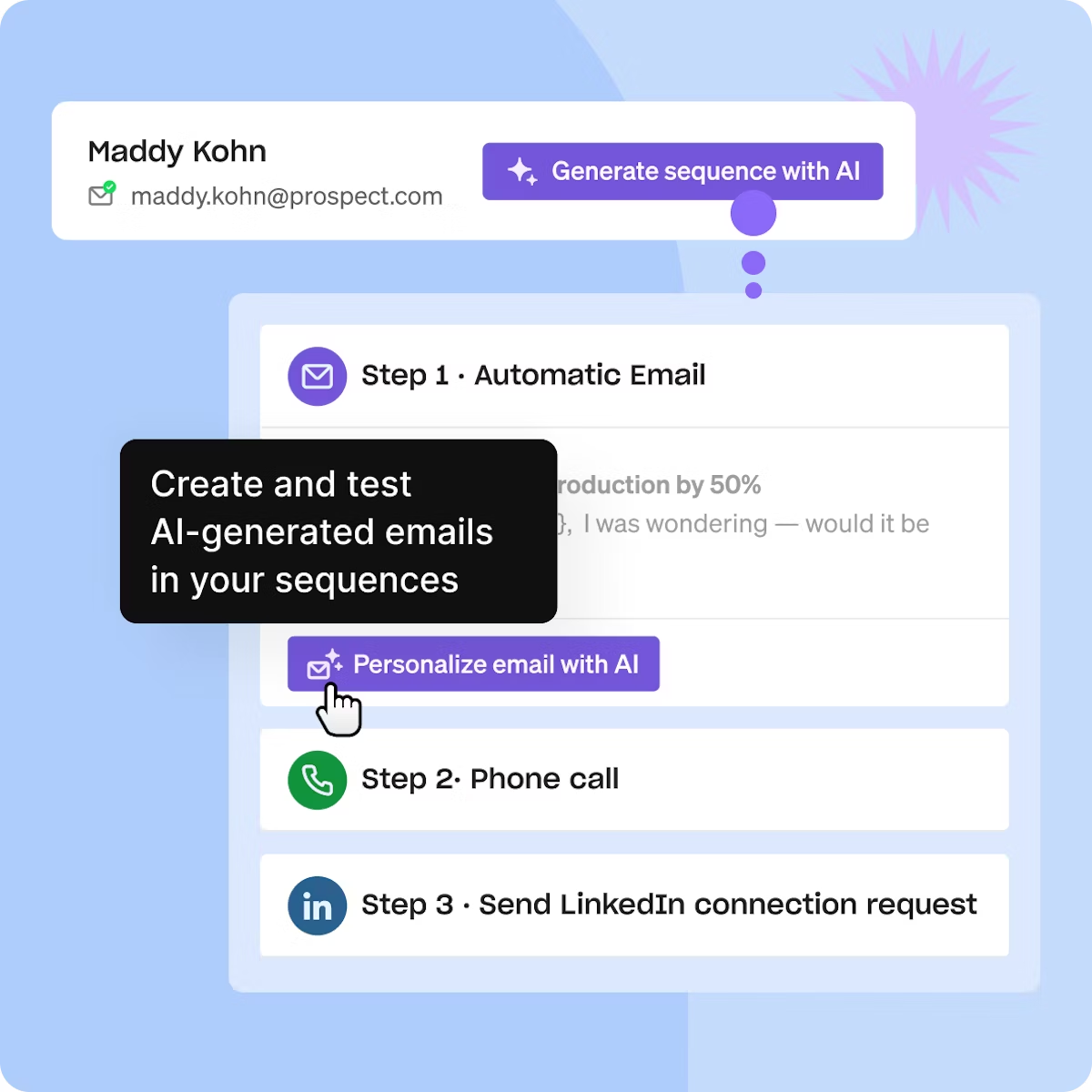
Warmup and deliverability
Having a warmup and deliverability feature built into your cold outreach software can really help tip the scales.
At the end of the day, it doesn’t matter how good or AI-generated your email copies are if they aren’t landing in your leads’ main inboxes. With a good and automated warm-up feature you can save yourself many headaches!
In this regard, we prefer Instantly, as it has a dedicated warm-up feature, whereas Apollo only offers a small email Ramp-up.
Instantly recently added a new pricing category named “Sending & Warm up”, this is dedicated not only to sending your email campaigns, but sending campaigns that work. Instantly offers +550,000 real email accounts for automated email warm-up.
You can connect unlimited accounts and keep warming them, however you wish to do so with customizable options.
With Instantly’s deliverability dashboard you’ll be able to track and monitor where your emails are landing.

On the other hand, Apollo currently lacks an actual warm-up feature. Nontheless, you can still prepare your email account for your campaigns with the Inbox Ram-Up, although it may take a bit more work.

The biggest downside of the Ramp-Up is that it can take up to two weeks, and during this time your schedules could be slowed down quite a bit.
However, you can monitor the status of the Ramp-up at any time as well as your mailbox health, a very useful feature to know where you need to make adjustments regarding deliverability.
Lead database
A lead database holds contact information of leads such as job title, location, name, contact details, LinkedIn, etc. When picking your cold outreach tool you’ll want to make sure that you can easily find useful and qualified leads within the tool.
Which is why we will be comparing Instantly’s and Apollo’s lead databases.
Instantly has a quite expansive lead database with +160 million verified contacts, although we should mention that it is not an all time high.
The best characteristic we find in Instantly’s lead database are the extensive filters and audience segmentation tools.
Some filters include:
- Job title
- Location
- Industry
- Company size
- Revenue range
- Keywords
- Lookalike domain
- Job listings (only un Hyper Leads)
- Technology
- Department
- Management level
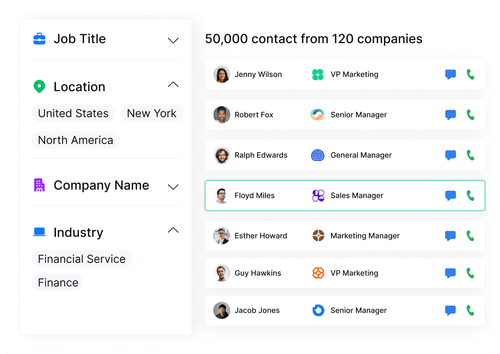
Apollo’s lead database offers +270 million data points, making it a more extensive (and preferable) lead database.
Although Apollo offers less filters, they’re still some very desirable options such as:
- Buyer intent
- Technologies
- Lists
- Persona
- Name
- Job titles
- Company
- Location
- Number of employees
- Industry and keywords
With Apollo you also have a feature to enrich your leads.
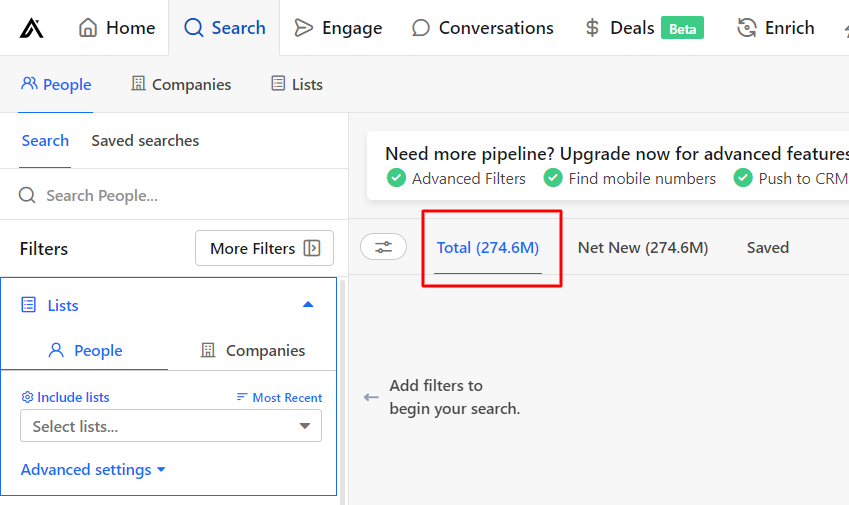
In this aspect, we consider that Apollo offers a stronger lead database.
Buyer intent signals
Reaching your leads when they are ready to buy your product or service is crucial to ensure your success. So having a tool that can provide insights into your leads’ buyer intent can be a real asset.
In this regard, Instantly offers fewer and less advanced filters in the database, so the star here is Apollo.
Apollo sends you alerts via Slack, email, or in Apollo’s control center when buying intent signals are detected.
This feature ensures that there are little to no cracks in your campaigns, and allows you to save time by avoiding extensive research or emails sent at the wrong time.
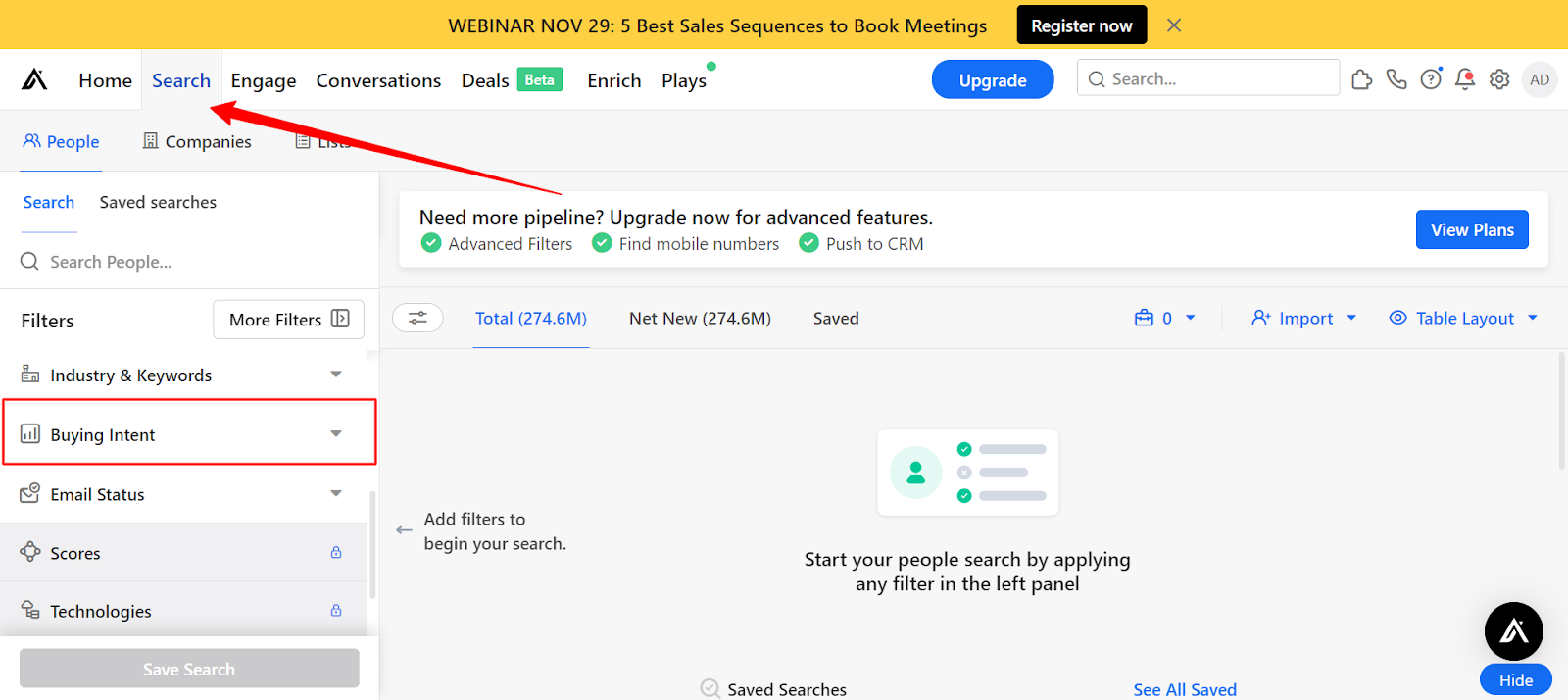
Overall campaign management
At the end of the day, what you’re looking for in a tool is that it get the job done and manages your work efficiently. You need strong sending capabilities and campaign optimization.
With Instantly you can set up your CC and BCC on your emails that will allow you to send the same copy to several people, perhaps inside a company so you ensure you don’t miss out on the decision maker.
Instantly also offers features such as A/Z testing to make sure that you’re reaching your campaign’s full potential. This feature makes it standout as a strong choice.
The best part is that Instantly offers Unibox, so you can send your campaigns from different accounts to avoid deliverability issues but not miss out on any messages are they are all centralized in one unique inbox.
The only downside here is that Instantly’s AI generator feature is not available on the Growth plan. Nonetheless you can access the inbuilt templates to create your sequences and simply edit to fit your needs.
Additionally in your sequences, you can set triggers to make sure that they don’t continue to send automatically once your lead has replied.
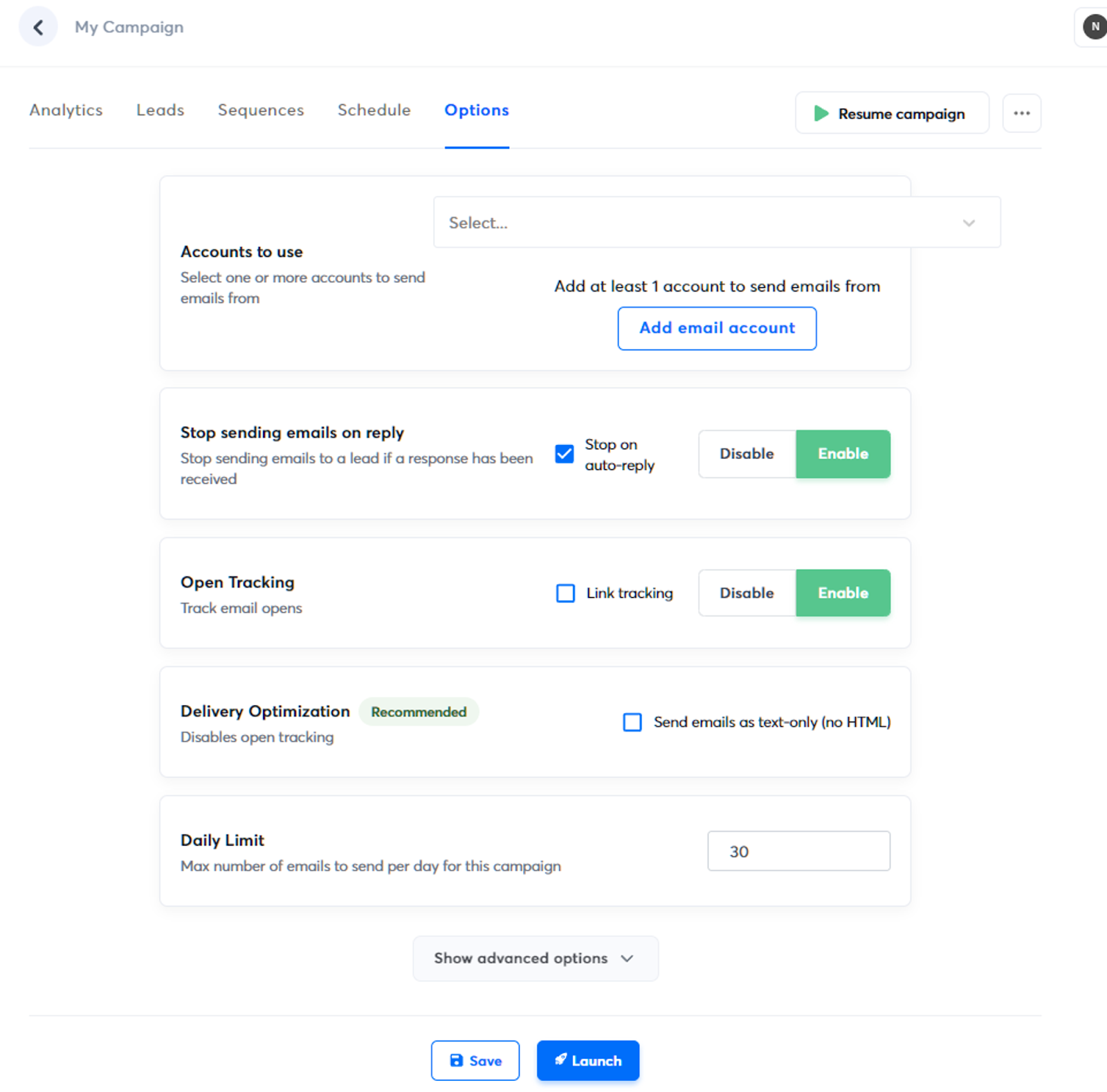
Apollo offers very strong outreach capabilities with many different options, including multichannel outreach including email, LinkedIn, and cold calling.
Apollo.io allows users to create and manage email sequences, making it easier to automate and personalize outreach campaigns, with an option to A/B test your sequences.
The platform’s interface is super intuitive, allowing for easy setup and tracking of email campaigns.
You can link multiple email accounts to Apollo, facilitating diverse outreach strategies.
Although Apollo does offer task management for teams, neither of these options are fully fit for agencies. So if you have an agency, you might be better off with a tool like lemlist!
Pricing comparison
We will be comparing both pricing models based on monthly billings, although bear in mind that it comes out a bit cheaper when billed annually!
Instantly’s pricing model has become a bit more confusing, as you now have to buy Leads, Campaigns, and CRM separately.
Instantly does offer a free trial.
Let’s take a look at all 3 products.
Sending and Warmup
When billed monthly, Instanty offers 3 pricing plans within Sending and Wamup:
The Growth and Hypergrowth plans have decent pricings ($37 and $97 per month), but it quickly scales X3 if you go for the Light Speed plan at a whopping $358 plan.
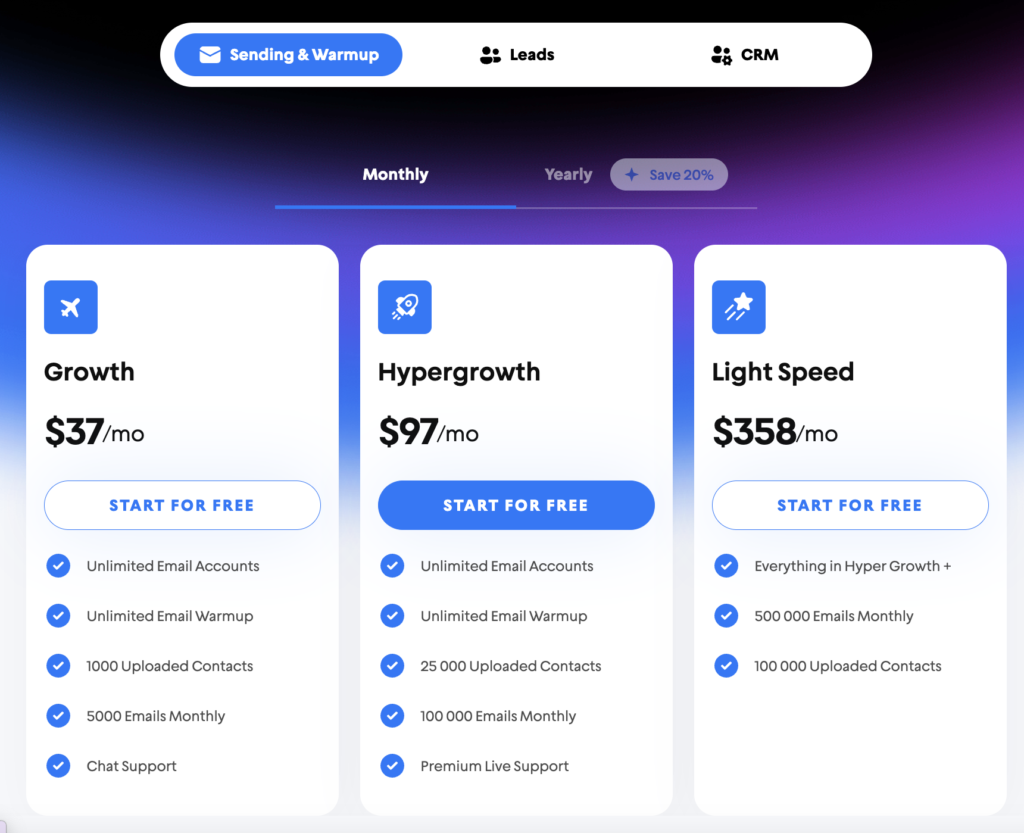
As we have mentioned, annual commitment tends to have a special discount, however with Instatnyl if you decide to get billed annually, you can also decide to invest in the Enterprise plan, with a custom pricing.
The major benefit of this plan are the dedicated account manager and private deliverability network.
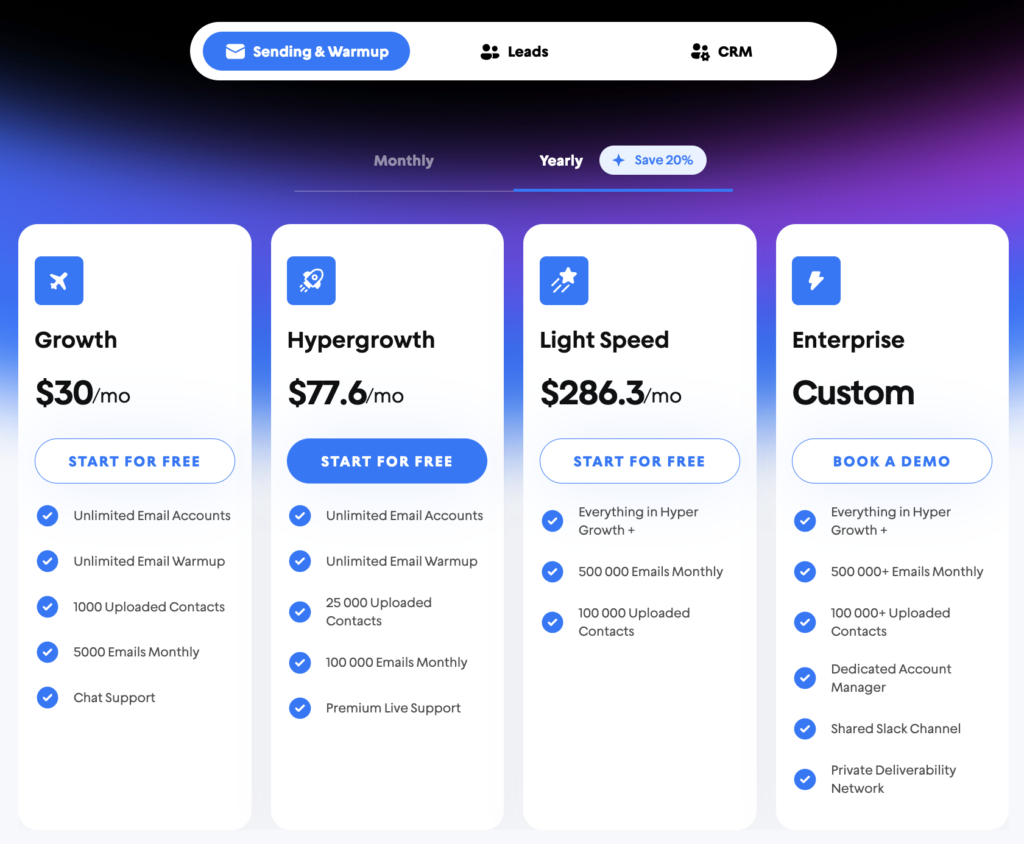
Leads
The product Leads is dedicated to the lead database primarily, the difference between each plan is the number of verified leads you can export by month.
The 4 pricing plans range from $47 per month all the way to $492 per month, which can seem pretty excessive for a database.
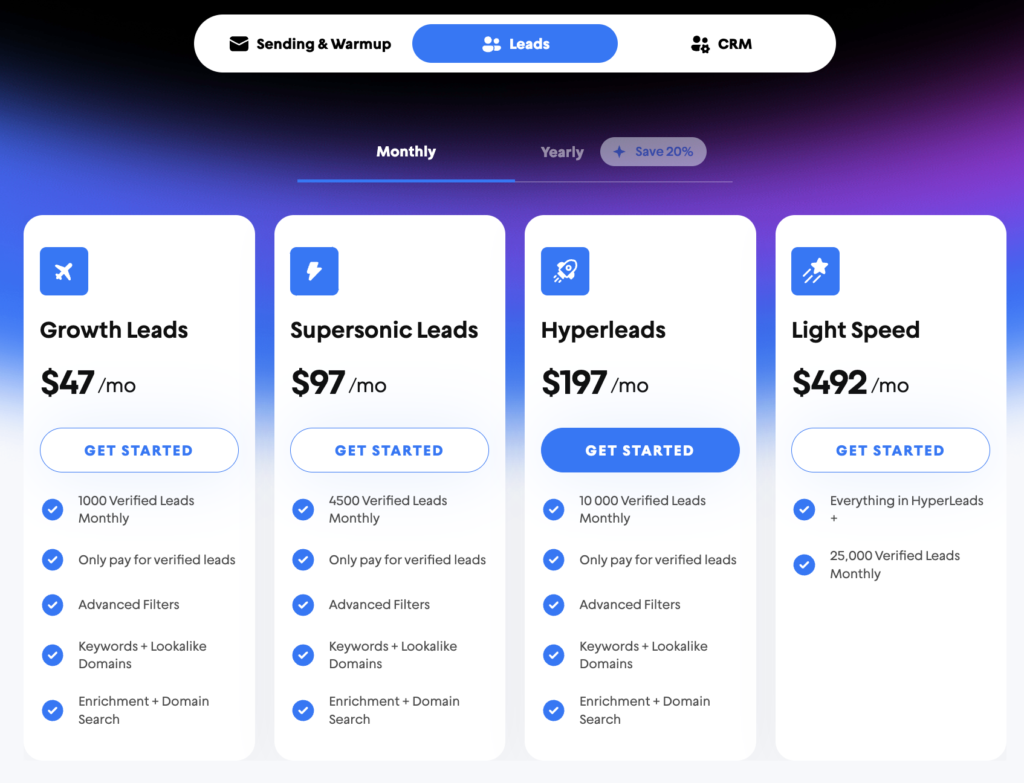
CRM
Instantly’s CRM offers 2 pricing plans set at $47 and $97 per month with many AI features in the Hyper CRM plan.
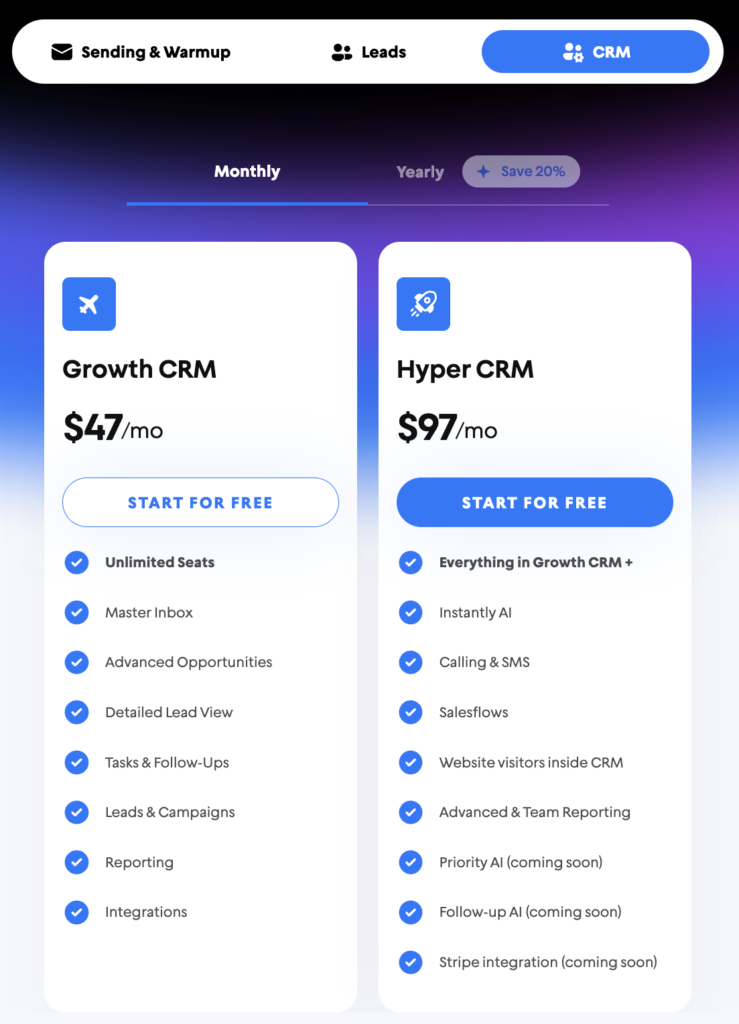
As you can see, the major problem with this pricing system is that your total monthly cost can scale very quickly if you need more than one product. However, it does avoid having to switch between different tools.
On the other hand, Apollo has a more straightforward pricing system, including a free plan and free trials in the Basic and Professional plans.
Apollo’s pricing ranges from $59 to $149, making it a more desirable option than Instantly.
Bear in mind that AI features are not included in the Free or Basic plans!
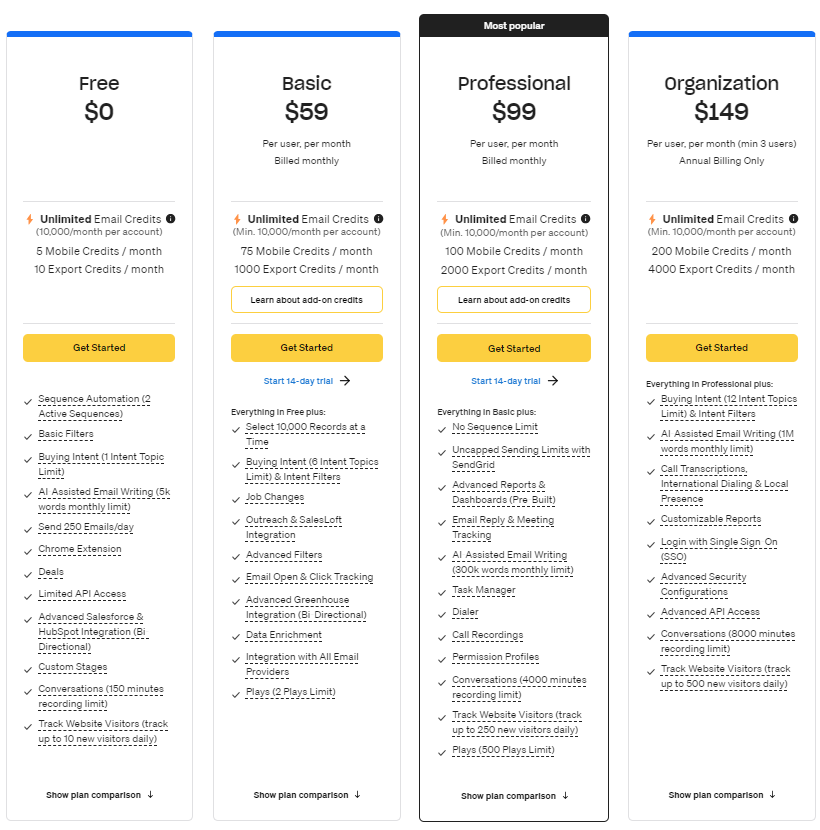
Pros and Cons
A quick overview of each tool is clearly not enough, after sifting through Instantly and Apollo’s reviews, here’s what users have to say about them:
→ Instantly ⭐⭐⭐⭐⭐
G2 4.9/5 (2,764 reviews) | Trust Pilot 4.5/5 (305 reviews)
| ✅ Pros | ❌ Cons |
| Overall high deliverability and good warm-up features | Limited lead management capabilities |
| Clear insights in the analytics dashboards | Higher plan is too expensive |
| Built-in CRM | Lacks onboarding |
→ Apollo ⭐⭐⭐⭐⭐
G2 4.8/5 (7,077 reviews) | Capterra 4.6/5 (345 reviews)
| ✅ Pros | ❌ Cons |
| Intuitive interface | Sometimes offers outdated lead information |
| Integration with other tools enhances workflow efficiency | Only 2 active sequences in Basic plan |
| Call recording feature | Lacks many leads’ phone numbers |
What do we prefer?
Instantly comes ahead in warm-up and deliverability and the lead database. Even though it has less contacts, the filters are much more detailed and ontact information is said to be more accurate.
Whereas Apollo comes ahead in personalization, buyer intent signal, and overall campaign management.
Nonetheless, the fact that Instantly has it’s own built-in CRM makes it a desirable option.
However, if you’re looking for the best overall option you can’t go wrong with lemlist!
- Top tier personalization (text, images, videos, LinkedIn voice notes)
- +450 million lead database
- Email Finder and Verifier
- Multichannel outreach
- Integration with top tools
- Campaign management
- Warm-up and deliverability booster
- …. and so much more!
Your source of actionable outreach tips and strategies that will help you get replies and grow your business.

